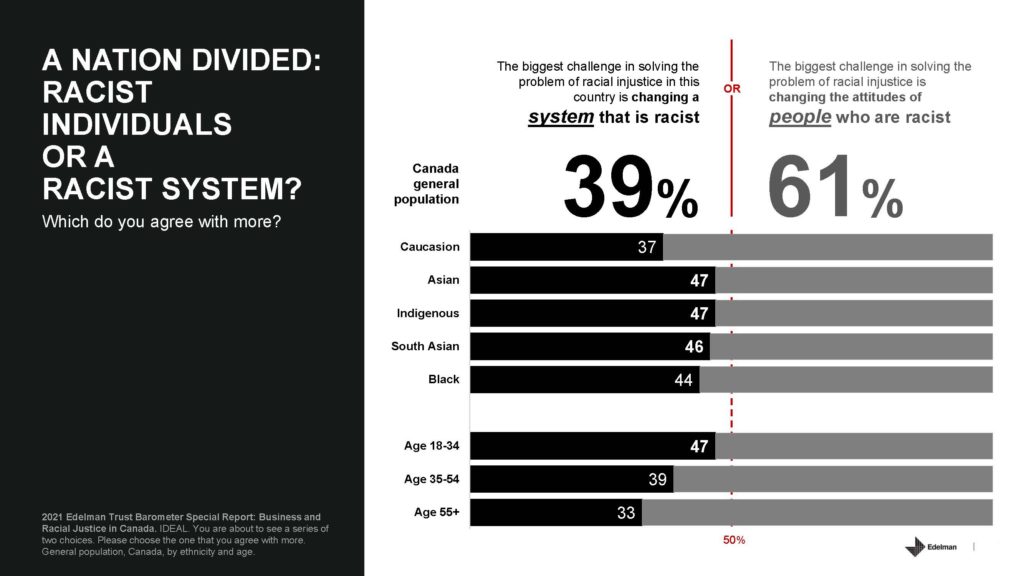(July 14, 2021) One year after the killing of George Floyd and the nation’s own identification of the systemic racial injustice faced in Canada by Indigenous Peoples, Black Canadians and racialized communities, people have new expectations for businesses and brands to take action in the fight against racial injustice, says the Edelman Trust Barometer’s Business and Racial Injustice in Canada report issued on June 28.
In 2020, Edelman says it explored the connection between brands and racial justice. This year, “we took a closer examination on the topic. The stakes have intensified, and it is time for businesses and brands to move beyond small steps.” The fieldwork for the survey took place between May 13 and May 19, 2021.
The survey of more than 2,000 Canadians found that racial injustice in Canada is a growing concern among Canadians in general.
Overall, 62% agreed “I am concerned about racism and racial injustice in this country,” an increase of 12 points between June 2020 and May 2021.
The level of concern broke along lines of racial identity:
- Among those identifying as Black, 80% were concerned
- Among those identifying as Asian 74% were concerned
- Among those identifying as Indigenous 67% were concerned
- Among those identifying as South Asian 66% were concerned
- Among those identifying as Caucasian 58% were concerned
Partisan affiliation had a major impact on peoples’ perceptions:
- Of those identifying as Liberal 73% were concerned
- Of those identifying as Conservative 45% were concerned
- Of those identifying as New Democrats 76% were concerned
Age also plays a factor with 72% of younger people (18-24) being concerned and 56% of older people (55+) being concerned.
When asked if the biggest challenge in solving the problem of racial injustice in Canada is “changing a system that is racist” or “changing the attitudes of people who are racist,” 61% of those surveyed said changing attitudes was the biggest problem, a conclusion shared across all racial identities.

It found that “Canada falls short on making progress on racial injustice over the last year” with:
- 45% of those identifying as Black saying “some or a lot of progress” has been made
- 23% of those who identify as Indigenous saying “some or a lot of progress” has been made
- 34% of those identifying as Caucasian saying “some or a lot of progress” has been made
The majority of Canadians surveyed say they witness or experience racism with the organization they work for. Two of five Canadians say workplace racism has damaged their employer relationship. Eighty three percent say brands and corporations that take a stand against racism are more likely to gain consumer trust.
Generally speaking, 72% of those surveyed expected their own employer to do the right thing when it comes to racism. With specific reference to NGOs:
- 54% of those who identify as Caucasian trust NGOs to do the right thing when it comes to racism
- 56% of those who identify as Asian trust NGOs to do the right thing when it comes to racism
- 40% of those who identify as Indigenous trust NGOs to do the right thing when it comes to racism
- 62% of those who identify as South Asian trust NGOs to do the right thing when it comes to racism
- 56% of those who identify as Black trust NGOs to do the right thing when it comes to racism
Other instructive information in this comprehensive survey includes the finding that 84% of Canadians expect CEOs to act in response to systemic racism and racial injustice, and that Indigenous respondents are most concerned about having their voices heard and acted upon.
The survey was conducted before the announcement of the first unmarked burial site at Kamloops Indian Resident School was made on May 27. Since that time there have been 1,309 unmarked burial sites located by ground penetrating radar at four sites in BC and Saskatchewan. The work continues.
Founded in 1952, Edelman PR is the largest public relations firm in the world by revenue. It has 6,000 employees and operates in more than 30 countries. It has been studying trust in institutions for 21 years.
Related reading
Report on the death of Colten Boushie further stains RCMP April 17, 2021
Rubin Kataki: ‘Collecting Courage is an open, urgent call-to-action to end racism in the charitable sector April 15, 2021
Feature Interview with Shanaaz Gokool: The cost of seeking justice. July 15, 2020
Allegations of sexual misconduct, racism and homophobia are rocking the Canadian Museum for Human Rights June 29, 2021
Charity, Philanthropy and the Structures of Racism June 17, 2020